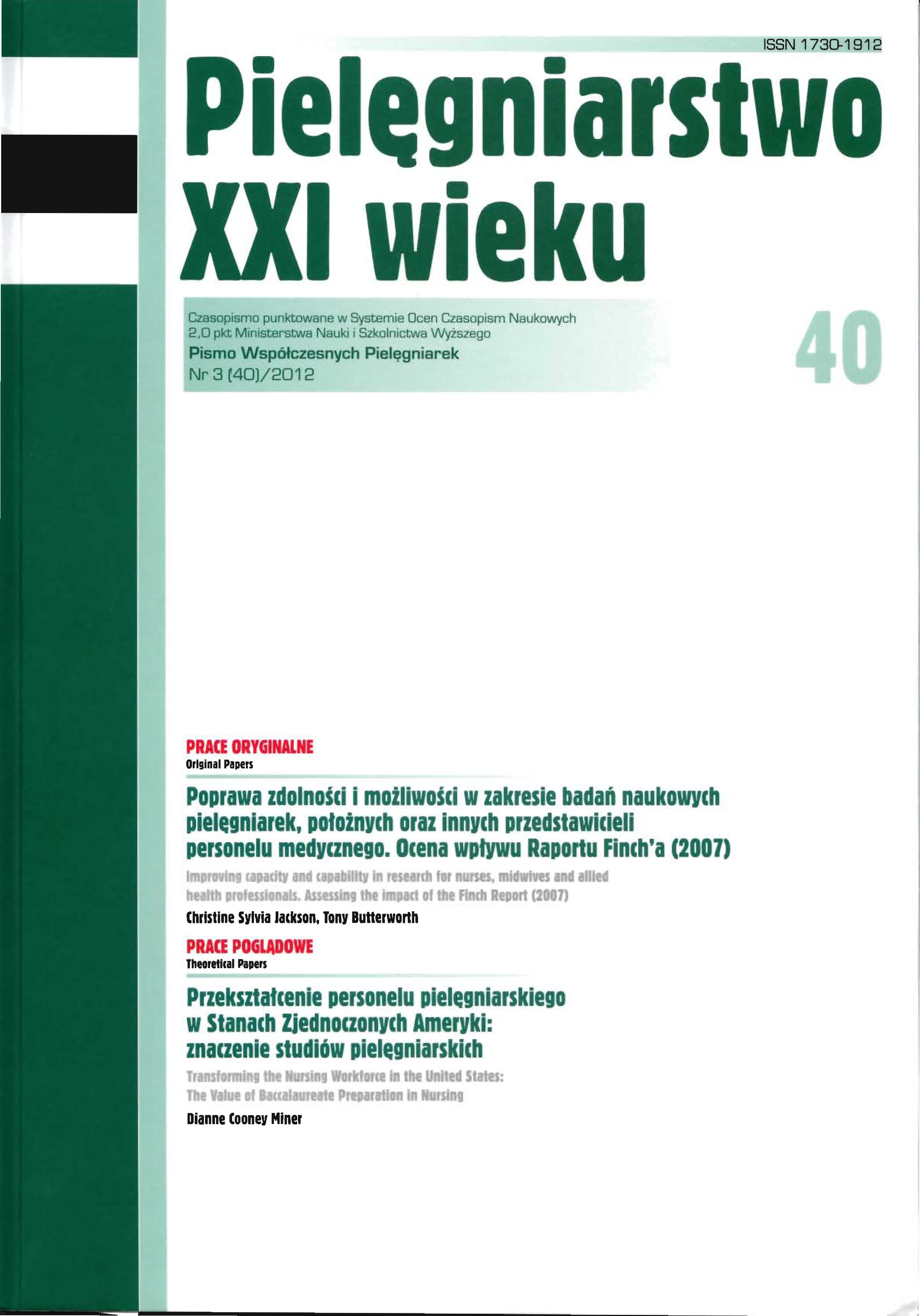Subjective assessment of health status and preparation for self-care among patients suffering from chronic kidney disease and diabetes
Keywords:
self-evaluation of health, self-care, nephropathy, diabetes, haemodialysisAbstract
SUBJECTIVE ASSESSMENT OF HEALTH STATUS AND PREPARATION FOR SELF-CARE AMONG PATIENTS SUFFERING FROM CHRONIC KIDNEY DISEASE AND DIABETES
Introduction. In the chronic kidney disease and diabetic nephropathy, requiring treatment haemodialysis, it is important to prepare the patient for living with the disease by increasing the capacity for self-care and complete knowledge of the disease. This determines the autonomy of the patient in functioning.
Aim. The aim of the work was to determine whether there are differences in the in self-evaluation of health, in the assessment of preparation for self caring among patients with chronic kidney disease and diabetes.
Material. The study comprised 236 persons in 4 groups: 1) patientswith chronic kidney disease in the CKD efficiency stage, 2) patients with chronic kidney disease at stage V, treated with haemodialysis CKD-HD, 3) patients with diabetes C and 4) patients with diabetes and diabetic nephropathy, treated with haemodialysis, group CKD-HD.
Method. The questionnaire survey (developed by authors) was used to collect research data.
Results. Differences in self-assessment of health status between groups are significant. None of the patients treated with HD considered their health as good. Those with CKD had the problems with self-assessment of health (as much as 48% of patients considered their condition as good), and patients with diabetes (up 19.23% were not able to make self-assessment).
Conclusions. The respondents have difficulty in self-assessment of health status. Patients regarded themselves to be well-prepared for self-care. These are overestimated ratings, so it is appropriate to carry on health education to these patients on regular basis.
References
1. Rutkowski B. Problemy epidemiologiczne i społeczne leczenia nerkozastępczego. [w:] Rutkowski B, red. Leczenie nerkozastępcze. Lublin: Wyd. Czelej; 2007, s. 16.
2. Czekalski St. Cukrzycowa choroba nerek (nefropatia cukrzycowa i inne choroby nerek w cukrzycy). Poznań: Wyd. Termedia; 2007, s. 106, 108, 126.
3. Motyka M. Psychoterapia elementarna w praktyce ogólnomedycznej. Kraków: Wyd. UJ, ; 2002, s. 24-25.
4. Heszen I. Kliniczna psychologia zdrowia. [w:] Sęk H, red. Psychologia kliniczna. Warszawa: Wyd. Naukowe PWN; 2005, s. 222-228, 230-235.
5. Kokoszka A, Santorski J. Psychodiabetologia dla lekarzy: postępowanie psychoterapeutyczne w cukrzycy. Narodowy Program Wsparcia Osób z Cukrzycą. Warszawa: Novo Nordisk; 2004, s. 12.
6. Tatoń J. Nauczanie samoopieki. Warszawa: Wyd. PWN; 1995.
7. Książek P, Nowaczyk R, Mierzwicki P, Hryniewiecka D, Załuska A, Załuska W, Książek A. Wiedza hemodializowanych pacjentów ze schyłkową niewydolnością nerek na temat zasad leczenia własnej choroby. Zdrowie Publiczne. 2005; 115 (1): 35-39.
8. Zawadzka B. Sytuacja psychologiczna chorych dializowanych i rola psychologa w ich adaptacji do leczenia. Nefrologia i Dializoterapia Polska. 2005; (9): 63-66.
9. Stangierska J, Marcinkowska M, Horst-Sikorska W. Problemy psychologiczne pacjentów z cukrzycą typu 1. Nowiny Lekarskie. 2002; 71 ( 4-5): 212-216.
10. Tobiasz-Adamczyk B. Wybrane elementy socjologii zdrowia i choroby. Kraków: Wyd. UJ, 2000; 33, s. 154-166, 204-209.
11. Poprawa R. Samoocena jako miara podmiotowych zasobów radzenia sobie i szczęścia człowieka. [w:] Heszen I, Życińska J, red. Psychologia zdrowia – w poszukiwaniu pozytywnych inspiracji. Warszawa: Wyd. WSPS; 2008, s. 106-109.
12. Tobiasz-Adamczyk B, Brzyski P. Subiektywna ocena stanu zdrowia i stan funkcjonalny osób starszych z chorobą niedokrwienną serca. Badania porównawcze w 12-letnim odstępie. Przegląd Lekarski. 2005; 62: 746-751.
13. Sierakowska M, Krajewska – Kułak E. Jakość życia w chorobach przewlekłych – nowe spojrzenie na pacjenta i problemy zdrowotne w aspekcie subiektywnej oceny. Pielęgniarstwo XXI wieku. 2004; 2 (7): 23- 29.
14. Płaszewska-Żywko L, Wilczek-Rużyczka E. Teoria pielęgnowania Dorothea`i Orem. Pielęgniarstwo 2000. 1996; 6(29): 10-13.
15. Kubacka-Jasiecka D. Perspektywy promocji zachowań zdrowotnych w zmaganiu się z ciężką chorobą somatyczną. Przegląd Psychologiczny. 1999; 42(4): 57-68.
16. Sharpe L, Currel L. Understanding the process of adjustment to illness. Social Science & Medicine. 2006; 62: 1153-1166.
17. Delamater A. Zwiększenie świadomego udziału pacjenta w procesie leczenia. Diabetologia po Dyplomie 2006, 3: 35-40.
18. Curtin RB, Sitter DC, Schatell D et alt. Self-management, knowledge, and functioning and well-being of patients with chronic kidney disease. Adv Chronic Kidney Disease 2008 Apr; 15(2): 191-205.
19. Pieniążek M, Trudujek M. Przygotowanie do samoopieki pacjentów leczonych dializami. Zdrowie Publiczne. 2002; 112 (Supl. 1): 158-160.
20. Wilczewska L, Książek J, Tatur G, Laddach I. Self-evaluation of knowledge about the disease and an assessment of socioeconomic situation among patients with a diagnosed diabetes mellitus. Zdrowie Publiczne. 2006; 116 (1): 19 - 22.
Downloads
Published
Issue
Section
License
Copyright (c) 2012 Alicja Marzec, Lech Walasek, Anna Andruszkiewicz (Autor)

This work is licensed under a Creative Commons Attribution 4.0 International License.




